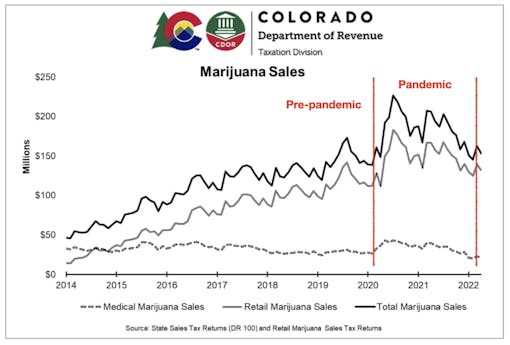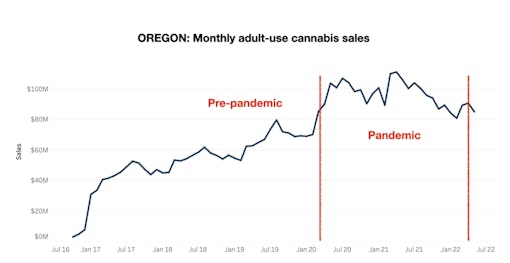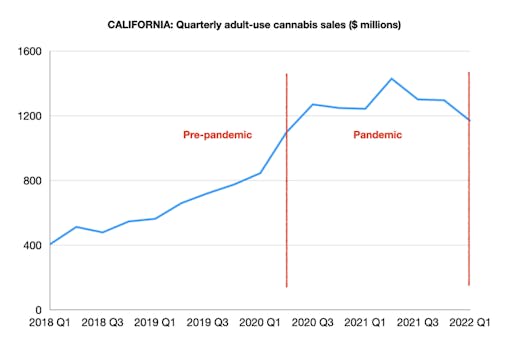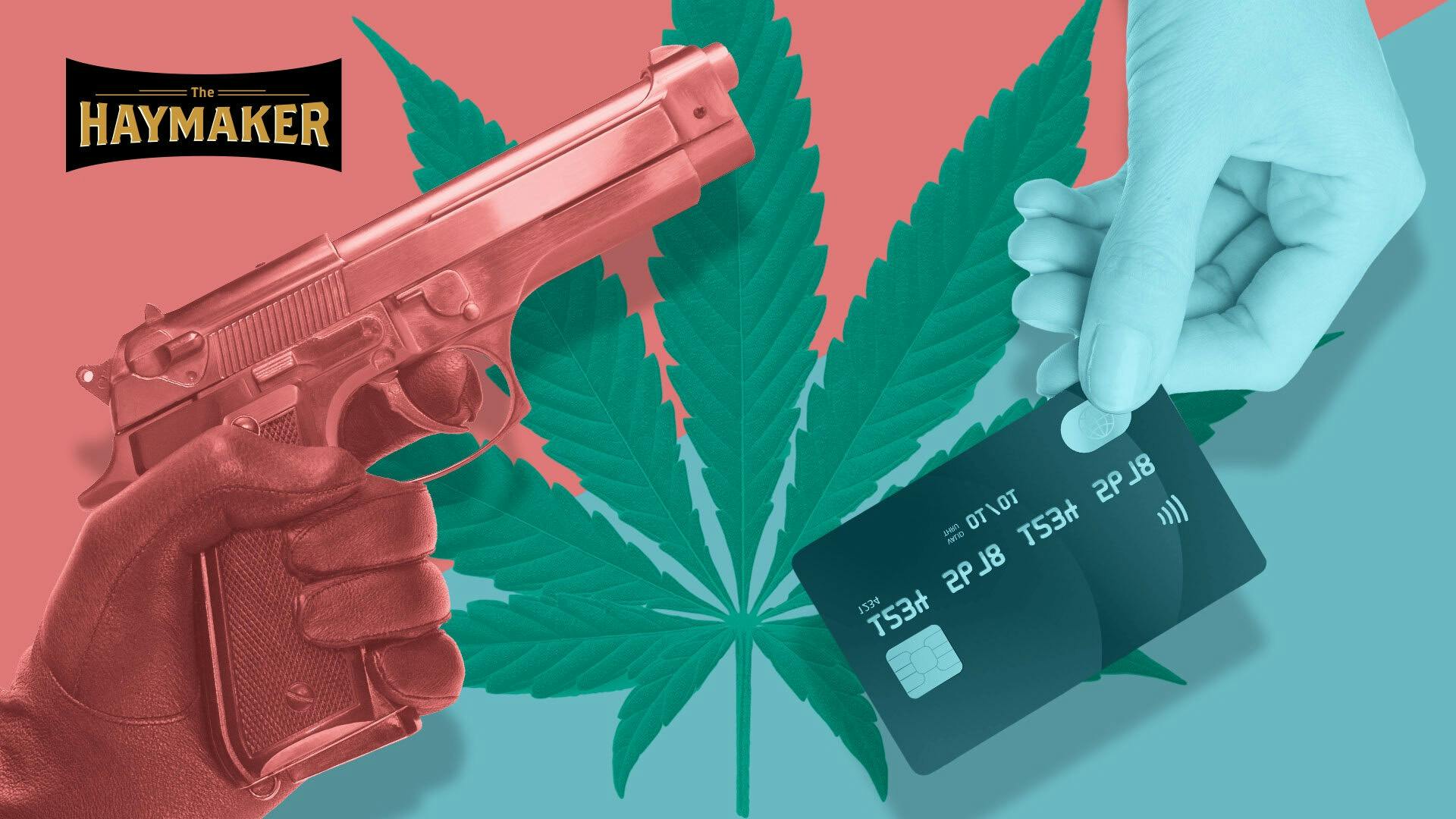The Haymaker is Leafly Senior Editor Bruce Barcott’s opinion column on cannabis politics and culture.
Two months ago, Dr. Anthony Fauci declared the United States “out of the pandemic phase” with regard to the Covid-19 virus. The federal government’s airline mask mandate ended that same week. Other pandemic’s-end signals are popping up all around us. Summer concerts and music festivals are happening for the first time since 2019. Graduation ceremonies are going on live and in person.
Now comes another sign that the pandemic era is waning: Cannabis consumers are buying less weed.
Data from three of America’s most mature legal cannabis states—Colorado, Oregon, and California—indicate that after nearly two years of increased consumption levels, customers are returning to their pre-pandemic buying habits.
We knew it couldn’t last forever
It’s a trend that’s playing out just as a number of cannabis market watchers expected. Back in the spring of 2020, when the Covid-19 pandemic gripped the nation, cannabis stores across the country experienced a dramatic buying bump as customers loaded up on supplies to help calm their anxiety and ease the long days and nights of the lockdown.
Even as doors closed and budtenders were forced to hand off pre-ordered purchases via curbside pickup, stores saw roughly a 30% uptick in sales.
We knew it couldn’t last forever, and it hasn’t. The rump side of the pandemic bump has now taken shape.
Take a look at Colorado’s monthly sales, which I’ve demarcated by pre-pandemic, pandemic, and post-pandemic periods:

That bump looks a lot like a similar one in Oregon’s monthly sales chart:

Here’s what California’s quarterly sales data looks like:

Mature markets reveal more
These are only three of the 13 operating adult-use markets, of course. Most of the other states are still too immature to offer much information on the question, because diminished per-capita purchasing is still being offset by new stores opening and more illicit-market customers migrating to the legal side.
Shop highly rated dispensaries near you
Showing you dispensaries nearColorado, Oregon, and California are markets with a relatively mature build-out and a stable number of retail stores. (I’m not including Washington, the other mature market, because the state’s data is notoriously tardy and poor.)
Sales still rising in younger legal states
Not every state is experiencing exactly the same pandemic bump. Sales in Massachusetts seem to be still holding steady at full pandemic levels. Monthly revenue in Arizona, Michigan, and Illinois continues to climb, but those states opened their stores just before or during the pandemic.
To be clear: Covid has not disappeared. More than 100,000 new cases are reported across the United States every day. But the pandemic era of our lives appears to be coming to a close. With vaccines available, we’re learning to live with the virus and adjust our own personal risk precautions.
With that closure, some of use may need a little less cannabis to manage our anxiety and stress.
The subsidence of the pandemic buying bump comes as no surprise to economist Beau Whitney, founder of Whitney Economics and co-author of Leafly’s annual Cannabis Jobs Report, He expected the buying slowdown to occur back in late 2021—but then the Omicron variant extended our global slowdown by a few more months. He says the end of the work-from-home period for many companies has forced a shift in consumption for many workers.
“Essentially, people have less opportunity to consume cannabis since they are somewhat back to work,” Whitney told me yesterday. “So sales have peaked in some states. Oregon is a great example of a state where we’re actually seeing negative short-term growth.”
Inflation and competition are also factors
Whitney pointed out that other factors, such as rising inflation and increasing competition, may also be having an effect. The pandemic matters—but it’s not everything.
Newly legal states like New Mexico and Arizona, he says, “are pulling demand away from nearby states like Colorado. And in some states you’re seeing derivative products”—like delta-8 THC products derived from hemp—“compete with licensed cannabis products. So there’s a competitive element to this as well.”
Whitney expects to see slower or even negative growth rates this year in some of America’s mature legal states. The cannabis tourism that once drove sales in markets like Colorado, Nevada, and California may decline as other states legalize and cannabis stores become less of an exciting novelty.
Lessons from the pandemic
What did we learn from all this? We learned—and elected officials acknowledged—that cannabis truly is an essential product for many adults.
The pandemic buying bump was driven by two main factors: need and opportunity. A whole lot of us needed relief from anxiety, from worry, from the stress of day-to-day survival in a worldwide global pandemic. We needed calm. We needed to sleep.
At the same time, work-from-home orders gave many of us an expanded opportunity to choose when, where, and how to integrate cannabis into our daily lives—without the boss constantly looking over our shoulder or grilling us about what went down in that “safety meeting” in the alley.
It’s a strange feeling to work in an industry where sales were actually helped by the pandemic. More than one million Americans have been killed by Covid since March 2020. This is nothing we wished for. But it’s been gratifying to see all the ways cannabis helped tens of millions of people care for their mental and physical health over the past two-plus years. In a growing number of states these licensed, regulated products aren’t merely legal. They’re essential.







